
Hello!
This post is written for you who are frantically trying to understand how childcare will fit into the equation of new-mom life. Many moms will have learned what I share below through trial and error. For some, the lessons have been costly. Others were spared the encounters leading to these lessons! I share these from my personal experiences as both a working mom and childcare business owner.
Lessons Learned
One: I am my child’s primary early childhood development specialist.
Period. Childcare providers are partners, but much of your child’s success at school will be driven by what is done at home. You might “luck out” and get an angel sent to you who will care for and help you raise your child for free. However, angels usually only appear for a short period of time! More than likely, you will need to rely on yourself to take the lead on getting your child’s educational and developmental needs met.
Two: I am the person responsible and accountable for my child’s proper education and development.
If your childcare provider is lacking in what they provide for your child’s development, you have options:
- Speak with them and make a plan to improve.
- Provide additional resources to make sure your child gets the experience that they need while in another’s care.
- Dump that provider and find another.
If you feel your child should be progressing faster, receiving more attention, or given greater challenges, take action. No need to complain or bring drama (unless there is a real safety issue or abuse). Exercise your options!
Three: It is my job to research, procure, manage, and monitor my childcare resources.
Though it’s nice when referrals and recommendations from friends and family work out, they don’t always. Try not to feel cheated or overwhelmed if you have to spend tons of time and energy researching, interviewing, and making the brave choice for yourself. And even after that, you will need to regularly observe and engage. Why? Because a resource or environment that identifies as “child friendly”, is not always the case. Even when it is, it might not be the right environment for YOUR child. Get used to being observant and engaged.
Four: When there are group resources available, the group trumps the individual.
That’s right, your child is unique but they are not “special” when it comes to group child care settings. I hate saying it that way because it sounds negative. It’s not bad or scary, it’s just what it is. Group care is set up to meet the needs of the greatest number of people served. This might seem like a “Well, duh” statement but the sense of this is not as common as you might initially think. When we think about our family or our child, especially regarding a care situation, there is a tendency for us to regard “ours” as greater than “theirs”. Here are some examples of how a parent might demonstrate a lack of understanding of group care dynamics:
- asking for special accommodations or provisions for their child
- asking for special accommodations for themselves or their family’s circumstances
- refusing to follow rules because they seem irrelevant to them
Granted, many childcare providers work hard to be as helpful to families as they possibly can. However, they not only have to consider the other 5 – 200 families that they serve, but they must also remain compliant with strict state and municipal regulations. Additionally, childcare providers tend to have tight operating budgets. This is an additional constraint to what can or cannot be offered, considered, or accommodated. So, as awesome and amazing as your child is, he or she is not the only consideration of the childcare provider. The group will come first.

Five: Read the childcare provider’s handbook!
When you are trying to decide on a provider, don’t assume that they are perfect for you just because the hours, the distance, and costs align. READ THE HANDBOOK!!! If they have one, they are most likely going to follow it and get rid of anyone who refuses to. Learn and understand how the provider operates and make it work for you. If you are not willing to conform, that provider will not likely be a good fit for you. Exit gracefully.
Six: My childcare “wants” are not my childcare “needs”
Actually, you’re going to find this one out pretty quickly! The sticker shock of childcare will arrange your priorities faster than a New York minute. (Do people still use that phrase?) Doesn’t matter. Just know that it is wise to make your list of “needs” and “wants” ahead of time so that you can stay focused on the prize. The prize is the childcare provider who can meet your needs. You can further clarify your needs by determining what is “non-negotiable”. You will find that many of the descriptions you list as “needs” are actually preferences or nice-to-haves.
Seven: Don’t burn bridges.
Parents and providers don’t always see eye to eye. That shouldn’t be a deal breaker, especially if your provider is meeting the majority of your needs. Choose your battles wisely. If you can’t come to an agreement on your “non-negotiables” and you must leave, do it respectfully. Remember, there might be a time in the future when the provider is a better fit for your family’s needs. Also, providers communicate with one another. You don’t want to lock yourself out of another arrangement because you mistreated your previous provider or refused to pay what was contractually owed.
And finally……..
Eight: Help is closer than you think!
You don’t have to do it alone! Utilize your network of family, friends, and professionals to learn about what is available to help you meet your child’s needs. Ask questions, set up a coffee or play date, or send a text! Use your networking skills to make the most of the knowledge and experience within your circle. Lean on your community!
